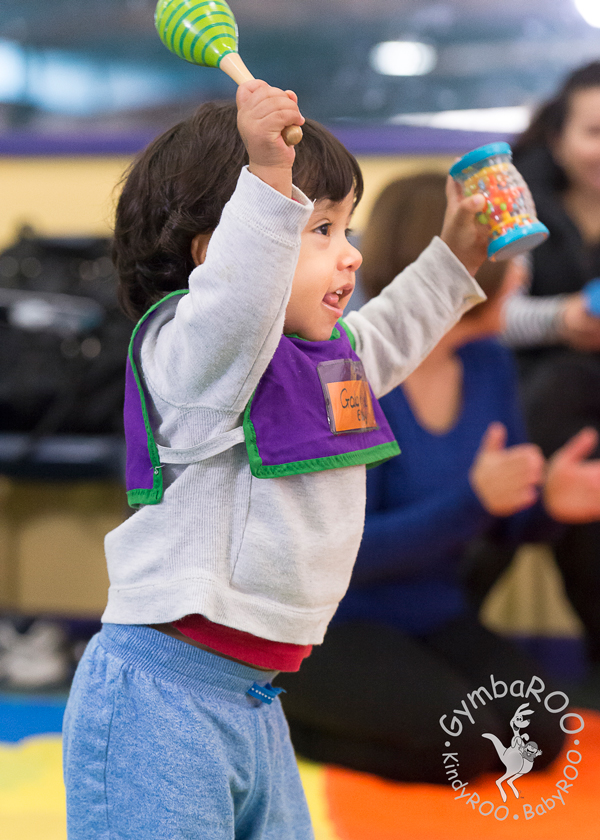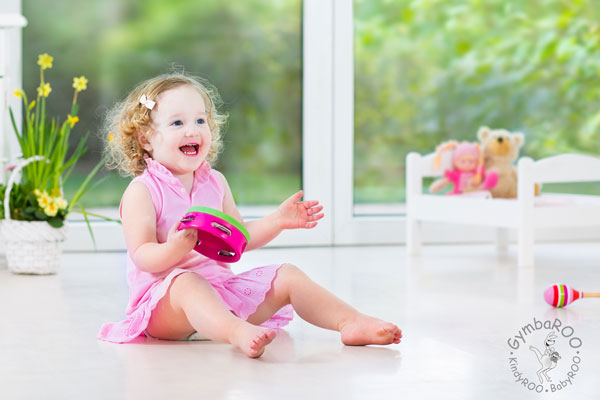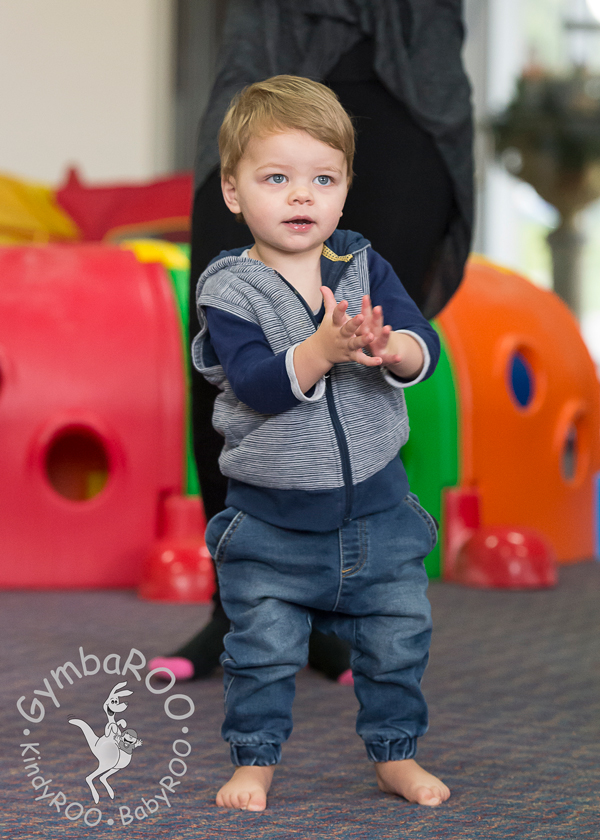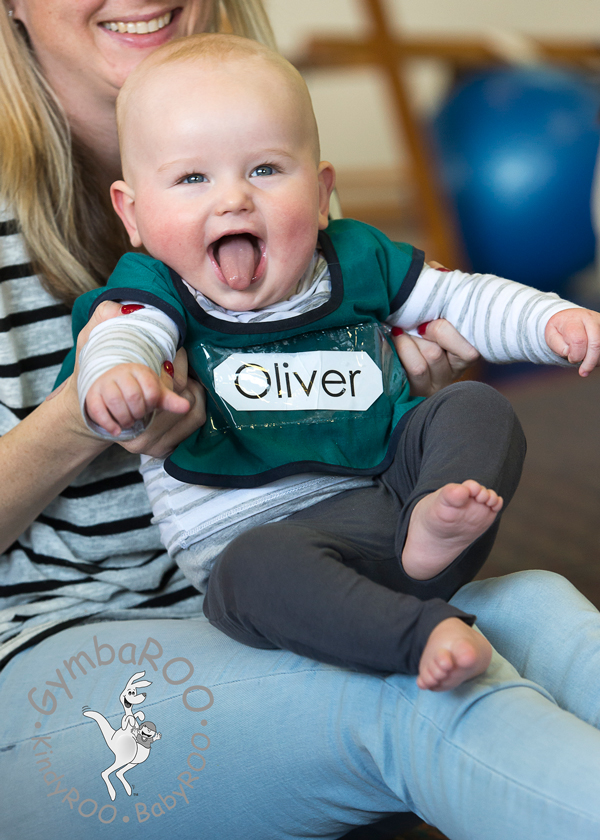Join the thousands of parents already raising smarter, happier babies with our online baby classes: The Active Babies Smart Kids series. Click here.
GymbaROO-KindyROO kids are excelling academically, emotionally, in leadership roles and on the sporting field. Find us at: GymbaROO-KindyROO
Tessa Grigg and Bindy Cummings
There are many, many developmental benefits to your child developing a good sense of rhythm; the development of speech, the understanding of maths, well developed coordination to name a few, however how learning to keep the beat can impact your child’s future social life is often overlooked.
How does being able to keep the beat help a child socially?
Most physical activities involve rhythm and have a beat – crawling, walking, jumping, running, hopping, skipping, kicking, throwing and so on. Mastering these skills enables your child to play more sophisticated games with other children, which gives them opportunities to make friends, which in turn encourages them to develop social skills and increases their enjoyment of life. All this, partly as a result of being able to keep the beat! It all sounds quite simplistic, but think about the children that you grew up with who found sport a real challenge. Generally they were not included in the ‘lunch-time’ games, they were the last to be picked for teams and their self-image took a real battering.
For many of these children there may have been a range of issues however, if you test a group of children who are challenged by sport you will find that many of them cannot keep the beat.
If a child learns to keep the beat, he or she then also develops the skill to be able to follow a rhythmic pattern. This follows quite naturally – you do not need to teach the rhythm, they can just do it. This helps them not only in sport, but also in following instructions, music, maths, speech, reading and writing as they are all skills based in rhythm. Good self esteem, confidence, happiness in learning and life flows from this.
How to help your child learn to keep the beat
Babies and growing children need to develop a strong sense of the beat and we parents need to provide the opportunities to help our little one’s learn to keep the beat.
Encourage your little ones to follow the normal, predictable sequence of developmental movements; tummy time, rolling, commando crawling, creeping, walking, running, jumping etc. Give them every opportunity to master and repeatedly practice these skills at each level. Don’t be in a rush to reach the next level! It is through repetition that your child will develop not only the motor ability, but also the rhythmic timing essential to able to smoothly execute future coordinated movements.
When it comes to music and rhythm, it’s simply not enough to just hear the beat. Researchers in Canada at McMaster University found that: ‘Hearing the beat alone was not sufficient to form long term neural pathways.’ Trainor and Phillips-Silver, psychologists who studied how babies perceive music, found that movement was the key factor in helping wire the brain to hear rhythm.
Our babies and children need to hear the beat and move, or be moved rhythmically to the beat. This is one of the many reasons we include so many rhythm and music activities at GymbaROO and BabyROO.
Babies
Ever found yourself standing somewhere swaying from side to side without your baby? If so, this indicates that you have naturally and instinctively been keeping the beat with your little one. You have also, more than likely, settled your baby from time to time by patting her back. These are good things!
- Whenever you are listening to music, gently pat your baby’s body, bounce or dance with her in time to the music (just keep the beat). She will thoroughly enjoy a good waltz, jive or foxtrot. Variety is the key. Different types of music have different beats.
- Choose music where there is a strong beat, the type of music that makes you want to tap your toes.
- Use instruments such as maracas, rhythm sticks or bells and help your baby to feel the beat.
- Sing songs and nursery rhymes to your baby. Make up the words if you don’t know them. There is nothing nicer for a child than the sweet sound of a mother or father singing. Don’t worry if you don’t think you can sing, the vibration of love for your child that is passed on is as important as the sound of your voice! This is also great for language development.
- Find hundreds of ideas, baby songs and rhythm games to do with your baby at your local GymbaROO-KindyROO centre and in our online baby classes for parents and babies here: Active Babies Smart Kids BabyROO series.
Toddlers
- Still keep the beat at every opportunity, continuing on with all the baby activities above, however encourage some independence with the use of instruments. Let your child hold the sticks and try tapping together. With a good range of experience many children will be able to keep the beat at this age some of the time, progressing eventually to all of the time.

Remember to keep it fun. If children are enjoying an activity, learning will come more easily. Music and movement provide so many opportunities for learning. Enjoy!!
Join in with this gorgeous song from GymbaROO’s online ABSK series and listen to Dr Jane Williams talk on some more benefits of rhythm!
Tessa Grigg (B.Ed, Dip Tch (Primary) Dip Tch (ECE)) is a qualified educator and professional musician who is focused on educating through music She is the co-founder of Tessarose Productions a company specialising in pre-school music. Tessa produces and sings many of the gorgeous songs you hear at GymbaROO and throughout our Active Babies Smart Kids online series. Bindy Cummings is a teacher, GymbaROO early childhood neurodevelopmental consultant and early childhood development lecturer. She is the Editor of GymbaROO’s ‘First Steps’ magazine. More on Bindy Cummings here. This article is an excerpt from GymbaROO’s and KindyROO’s First Steps magazine.
GymbaROO Images by Studio Z Photography
GymbaROO-KindyROO
Thousands of parents, babies and children are presently involved in our programs and creating rising stars. GymbaROO-KindyROO kids are excelling academically, emotionally, in leadership roles and on the sporting field. Come join all the fun and learning! “GymbaROO – The best decision I ever made for my child.” Classes from 6 weeks old – 7 years GymbaROO KindyROO
Active Babies Smart Kids – Online Baby Classes
GymbaROO-KindyROO’s online series of baby classes is taking the parenting world by storm! It is highly recommended by doctors, paediatricians, early childhood experts and the Maternal Child and Family Health Nurses Association. This series is being called: “The essential guide for parents”. Join the thousands of parents already playing with their babies from birth, in the best way for brain and body development and laying crucial foundations for future learning. What happens in the first year, not only matters, it matters a lot! Enjoy the introductory video below.
Click here: Active Babies Smart Kids online series of baby classes
Try the first episode FREE: Tummy time + baby fun and development class 1
Enjoy the following GymbaROO-KindyROO articles
GymbaROO-KindyROO: Who, what, where, why and how
All about GymbaROO-KindyROO’s online baby classes for parents and babies: Active Babies Smart Kids
How to raise a smarter, happier baby
Supercharge your child’s brain development with music. Latest research. Dr A.Collins
Music that is perfect for your child’s brain development.
More important reasons to teach your baby / child to ‘keep the beat’
Six benefits of nursery rhymes
My baby’s got rhythm. Musical activities to share with your baby.



